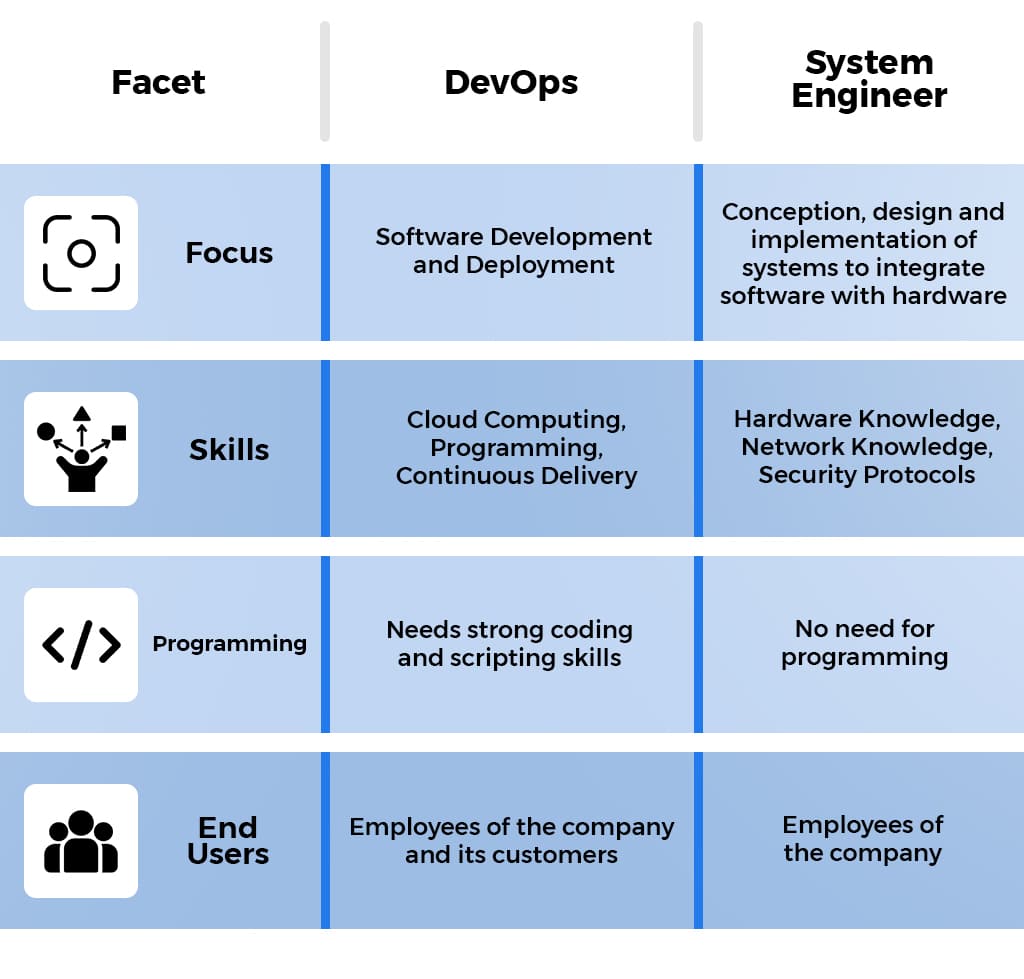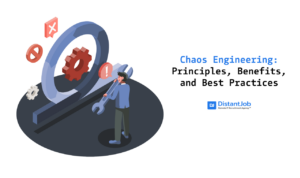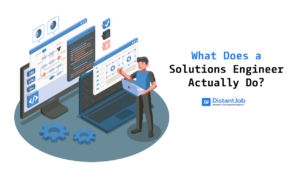For tech industry professionals and those seeking to enter it, understanding the nuanced differences between DevOps and traditional sysadmin roles is essential. The DevOps model merges the development and operations disciplines, advocating for automation and treating system issues as bugs to be resolved within the software lifecycle. Contrastingly, the classic sysadmin role adopts a reactive stance, focusing on issue resolution as they arise and maintaining a repository of solutions for future use.
Let’s go more in-depth and find out what exactly distinguishes a SysAdmin from a DevOps and how, based on their roles and skills, both can impact and improve your company’s internal processes.
DevOps and System Administrator: An Overview
SysAdmins are responsible for a company’s computer systems and underlying infrastructure, including staff computers and servers. Their main function is the maintenance and upkeep of said computer systems to ensure they run at the best performance possible and with maximum availability while keeping them secure and protected from threats. Other duties include software installation and management and technical support for the company and its staff.
DevOps is a relatively new field. With the advent of cloud-based computing, some tasks originally performed by SysAdmins became either automated or transferred to the cloud service providers (when a company isn’t manning its own cloud network). DevOps surfaced to help make the most out of these services by providing automation of various software-related processes, and collaboration between IT development teams.
What does SysAdmin do?
A SysAdmin, or System Administrator, is a professional tasked with maintaining, configuring, and ensuring the reliable operation of computer systems; particularly multi-user computers, such as servers. SysAdmins are responsible for ensuring that the systems are running efficiently and securely. They manage issues through a structured approach, addressing problems as they arise and documenting solutions in a detailed manner.
This role is pivotal in troubleshooting, system repairs, and maintaining the organization’s IT infrastructure. Their approach is reactive, focusing on resolving problems and documenting the process for future troubleshooting.
What does a DevOps do?
DevOps represents a shift in IT culture, focusing on the rapid delivery of IT services through the adoption of agile, lean practices in the context of a system-oriented approach. It bridges the gap between software development (Dev) and IT operations (Ops), treating the process as a continuous cycle that involves all aspects of the technology stack, from system hardware to software applications.
They focus on continuous integration, continuous deployment (CI/CD), infrastructure as code, monitoring, and collaboration to ensure faster and more reliable software releases. Their goal is to improve efficiency, enhance collaboration between development and operations teams, and ensure the consistent and efficient delivery of software products.
DevOps vs SysAdmin: 4 Main Differences
There are a few differences between a sysadmin and a DevOps engineer based on skills, roles, focus, and end user. A sysadmin typically manages and maintains IT infrastructure with a focus on stability and user support, while a DevOps engineer emphasizes automating and integrating development and operations processes to enhance deployment efficiency and team collaboration.
The key difference is that sysadmins concentrate on infrastructure management, whereas DevOps engineers aim to streamline and automate the development pipeline.

1. Job Responsibilities
The responsibilities of each job are quite different.
SysAdmins’ duties are related to a company’s computer infrastructure, focusing on the configuration, performance, and security of those systems. They are primarily responsible for maintaining the company’s hardware, networks, and software.
DevOps is mainly responsible for fostering a collaborative environment between all IT departments within a company while also helping them automate mundane tasks and improve their overall efficiency. This automation will usually be done through cloud-based services, either internal or external.
2. Skills
Since their jobs are so different, it is no surprise that they also require different skills.
SysAdmins’ jobs will most usually revolve around:
- Hardware and Software Installation: SysAdmins will usually be called to install and prepare working stations for the rest of the staff.
- Technical Support: In the same vein, they will also be called on when these working stations are no longer working as needed or as efficiently. They are responsible for fixing any hardware or software issues that may arise over time.
- System Upgrades and Monitoring: SysAdmins need to maintain the company’s computer systems As such, they should be able to upgrade and monitor them regularly to ensure the best functionality and security.
DevOps will usually require the following skills to fulfill their job:
- Cloud Expertise: Since part of their job is related to cloud services, DevOps should navigate those systems deftly to provide the best configurations and output for all other IT departments in the company.
- Coding and Scripting: To automate and enhance processes, DevOps should be familiar with languages appropriate to the development environments of their company. Most of the time, these will be scripting languages, but sometimes some knowledge of languages used by other IT teams for development purposes will be required as well.
- Continuous Integration and Delivery: To be truly flexible and efficient, development teams need, now more than ever, to have automated processes for building, testing, and deploying software projects. DevOps should have the knowledge and tools needed to provide these automated services.
3. End Users
Both jobs work in order to benefit the other staff at the company.
However, DevOps have an extra responsibility in this regard. Managing the processes of software deployment, also directly impacts a company’s customers and end-users.
4. Salary
As expected, DevOps vs SysAdmin salary is one of the points where both differ. All values were sourced from Payscale’s salary search.
A SysAdmin salary averages to about $64k a year.
A DevOps salary will largely depend on seniority:
- A regular DevOps will earn on average about $99k a year.
- A senior DevOps can earn around $118k a year.
- A DevOps system administrator’s salary averages about $122k a year.
On average, a DevOps will earn more than a SysAdmin, but they also have more responsibilities and need more technical know-how. DevOps administration will usually be a very demanding job since it interfaces with the whole company in some way or another. That explains why a DevOps Administrator can earn about twice as much as a SysAdmin.
Final Thoughts
Companies need the best to stay on top of current market trends and succeed. That begins with not only the people working for the company but also making sure that their work is stress-free and as effective as possible.
In their own different way, SysAdmins and DevOps help facilitate the work of development teams. We hope we’ve conveyed how important both are for the functioning and continuous improvement of the inner processes and workflows of your company.
If you are looking for DevOps for your company, DistantJob can provide you with people who specialize in cloud technologies and scripting languages to automate your processes.
Alternatively, if you’re looking to hire expert developers for your projects, we can also provide you with top-level developers that can easily match your company’s needs and are a perfect cultural fit. Get in touch with us today!
Frequently Asked Questions
Yes. A DevOps engineer is an IT professional who bridges the development and operational aspects of software development projects.
Not exactly. While DevOps can be viewed as a sort of extension of SysAdmin, companies still require staff proficient in both jobs to perform their specialized tasks. DevOps are becoming more popular due to the transition of some company systems to the cloud, but a SysAdmin is fundamentally different and equally required.
Yes. Although a DevOps job is usually more demanding in terms of knowledge and skill requirements, the transition from SysAdmin to DevOps can be done with proper training and education.
No. As we’ve established previously, DevOps will usually be responsible for facilitating the development of, and operations related to software projects. Most of this is accomplished through the automation of several processes, such as building, testing, and deploying the software in development.
A System Engineer is responsible for integrating technologies in the company’s workflows in order to improve them. They evaluate the systems and resources in place (including hardware, software, and staff) and find ways to optimize the technical systems they are a part of.





